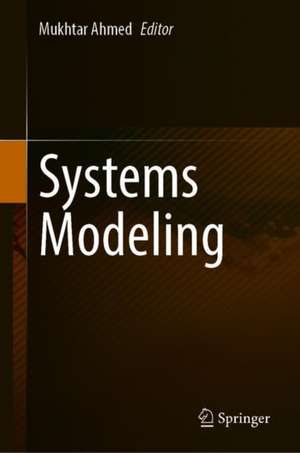Systems Modeling
Editat de Mukhtar Ahmeden Limba Engleză Hardback – 14 iul 2020
| Toate formatele și edițiile | Preț | Express |
|---|---|---|
| Paperback (1) | 1114.65 lei 6-8 săpt. | |
| Springer Nature Singapore – 14 iul 2021 | 1114.65 lei 6-8 săpt. | |
| Hardback (1) | 910.68 lei 38-44 zile | |
| Springer Nature Singapore – 14 iul 2020 | 910.68 lei 38-44 zile |
Preț: 910.68 lei
Preț vechi: 1198.26 lei
-24% Nou
Puncte Express: 1366
Preț estimativ în valută:
174.28€ • 189.24$ • 146.39£
174.28€ • 189.24$ • 146.39£
Carte tipărită la comandă
Livrare economică 18-24 aprilie
Preluare comenzi: 021 569.72.76
Specificații
ISBN-13: 9789811547270
ISBN-10: 9811547270
Pagini: 425
Ilustrații: XI, 425 p. 152 illus., 101 illus. in color.
Dimensiuni: 155 x 235 mm
Ediția:1st ed. 2020
Editura: Springer Nature Singapore
Colecția Springer
Locul publicării:Singapore, Singapore
ISBN-10: 9811547270
Pagini: 425
Ilustrații: XI, 425 p. 152 illus., 101 illus. in color.
Dimensiuni: 155 x 235 mm
Ediția:1st ed. 2020
Editura: Springer Nature Singapore
Colecția Springer
Locul publicării:Singapore, Singapore
Cuprins
Chapter 1. Systems Modeling.- Chapter 2. Crop Phenotyping.- Chapter 3. Statistics and Modeling.- Chapter 4. Dynamic Modeling.- Chapter 5. Models Calibration and Evaluation.- Chapter 6. Wheat crop modeling for higher production.- Chapter 7. Genetic Analysis.- Chapter 8. Sugarcane: Contribution of process-based models for understanding and mitigating impacts of climate variability and change on production.- Chapter 9. Forecasting of rainfed wheat yield in Pothwar using Landsat 8 satellite imagery and DSSAT.- Chapter 10. Methane production in dairy cows, inhibition, measurement and predicting models.- Chapter 11. Sunflower Modeling: A Review.- Chapter 12. Disease Modeling as a Tool to Assess the Impacts of Climate Variability on Plant Diseases and Health.- Chapter 13. Chickpea Modeling under Rainfed Conditions.- Chapter 14. Potato Modeling.- Chapter 15. Application of Generalised Additive Model for Rainfall Forecasting in Rainfed Pothwar Pakistan.
Notă biografică
Mukhtar Ahmed’s research focuses on the impact of climate change on crop ecology, crop physiology, cropping system and rain-fed ecosystem management. He has been involved in teaching and research since 2005. During his PhD and visit to Sydney University, Australia, he worked on the application of APSIM as a decision support tool, and rainfall forecasting using generalised additive models. He was awarded a young scientist fellowship by APCC South Korea. He also won a research productivity award from Pakistan Council of Science and Technology (PCST), and a Publons reviewer award in 2018 and 2019. He was part of the Regional Approaches for Climate Change (REACCH) project in the USA, which developed multi-model ensemble approaches to minimize the uncertainties. He is involved in the use of statistical and dynamic models as risk management tools to mitigate the challenges of climate change. His current research includes agroecosystems modelling, precision agriculture, modelling the nutrient use efficiency of legume-based cropping systems, forage agronomy and physiological responses to climate variability and its modelling. He is a Project co-leader in the Model Calibration Group of the Agricultural Model Intercomparison and Improvement Project (AGMIP) Wheat and Maize Evapotranspiration.
Textul de pe ultima copertă
Achieving food security and economic developmental objectives in the face of climate change and rapid population growth requires systems modelling approaches, for example in the design of sustainable agriculture farming systems. Such approaches increase our understanding of system responses to different soil and climatic conditions, and provide insights into the effects of various variable climate change scenarios, providing valuable information for decision-makers. Further, in the agricultural sector, systems modelling can help optimise crop management and adaptation measures to boost productivity under variable climatic conditions. Presenting key outcomes from crop models used in agricultural systems this book is a valuable resource for professionals interested in using modelling approaches to manage the growth and improve the quality of various crops.
Caracteristici
Presents cutting-edge outcomes on crop growth modeling, decision support system and model-based information technologies for crop growth prediction Discusses models to study impact of climate variability on various systems Includes model applications in the design of adaptation and mitigation strategies for agricultural systems Promotes digital agronomy and quantification of systems
